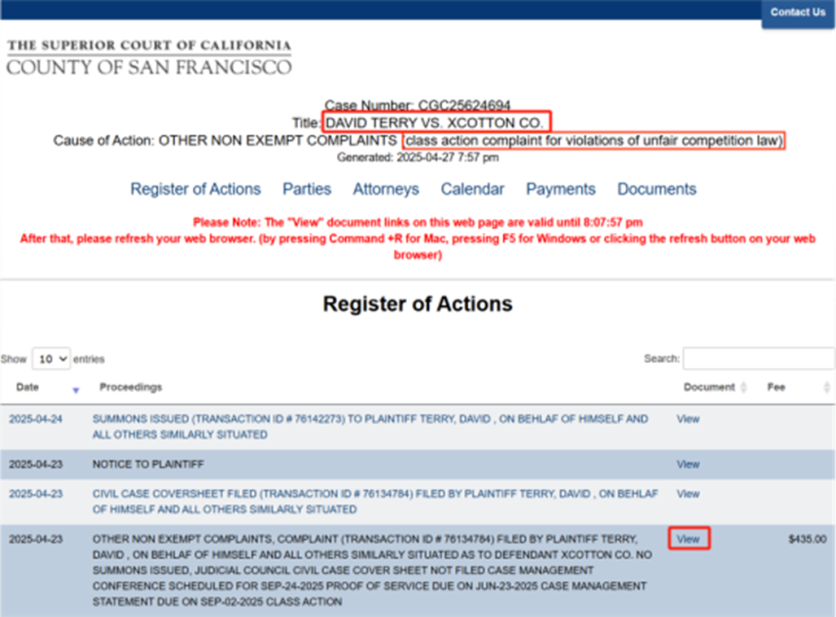On April 23, 2025, the Superior Court of San Francisco officially accepted a class action lawsuit filed by California consumers (case number: CGC-25-624694, link to relevant documents provided at the end).
The defendant in this case is the cross-border e-commerce service company Xcotton Co. The lawsuit indicates that Xcotton's parent company is based in the Cayman Islands, and its website states that it is located in Shanghai, providing cross-border "insurance protection products and services."

The plaintiff in this case, represented by a named plaintiff who is Terry, along with many other consumers facing similar issues, could have a significant impact, potentially involving a group of sellers and entangling them in the legal proceedings.
In the U.S. legal system, class action lawsuits are part of a punitive compensation procedure where affected consumers are bound together as a "class" to collectively sue the defendant for infringing consumer rights.
According to the class action complaint, the plaintiff noticed while browsing a certain e-commerce website that there was mention of "accident protection provided by XCOOTON" on the "Add to Cart" button. This service was an e-commerce extended warranty service provided by Xcotton. The plaintiff selected a three-year extended warranty service for $14.99.

As per California regulations, selling extended warranties in the state requires obtaining a Service Contract Administrator license and approval for contract terms. However, Xcotton failed to complete any licensing or approval procedures, resulting in continuous violations of California Insurance Code section 12815 and California Home Furnishings and Services Contract Law section 9855.
Therefore, the plaintiff filed a lawsuit seeking a court order for Xcotton to cease selling extended warranties in California and bear compensation responsibility.
The class action complaint states that all California consumers who purchased products from e-commerce websites in cooperation with Xcotton and simultaneously purchased Xcotton's extended warranty plans since April 23, 2021, are automatically included in the plaintiff group of this class action lawsuit, with an estimated member count of thousands. Once the court certifies the class action, the judgment will apply to all members simultaneously.
This implies that the class action lawsuit involving Xcotton is no longer just a matter for a single company but a significant industry event that many sellers must pay attention to.
Sellers involved may face a series of potential risks:
- Data disclosure pressure: The complaint indicates that to determine which consumers are eligible to participate in the class action, the court may require sellers who collaborate with Xcotton to submit records of extended warranty sales. Sellers may be compelled to participate and disclose sensitive data such as orders, payments, and claims.
- After-sales pressure and daily operational issues: The plaintiff requests temporary and permanent injunctions. If the judgment takes effect, sellers must immediately remove Xcotton's extended warranty services from their product pages in California. Subsequently, they will need to handle consumer refunds, exchanges, and other matters, which, while requiring additional resources, will also impact daily business operations to varying degrees.
- Negative impact on brand perception: Online flagship stores and independent sites are the primary platforms for showcasing seller brands. If extended warranty services are removed, consumers may associate seller brands with the warranty service brand, affecting brand perception and loyalty, potentially impacting repeat purchases.
Given the win-win nature of extended warranty services, extended warranties have increasingly become a mutual choice for both e-commerce buyers and sellers in recent years.
It is important to note that there are strict qualification requirements for extended warranty service providers according to the law. California regulations require any company providing extended warranty services to e-commerce to hold a Service Contract Administrator license if they assume claims, charges, or contract management responsibilities (see California Insurance Code §12815(b) and Home Furnishings and Services Contract Law §9855.1(a)).
In this context, choosing a compliant extended warranty service provider is an unavoidable topic for cross-border e-commerce and brand expansion enterprises. Before incorporating such warranty schemes, sellers should proactively request and verify this license to reduce the risk of being inadvertently involved in compliance disputes or data disclosure. This proactive approach can prevent years of painstaking business efforts from going to waste.
Reference Links:
Reference Link 1: San Francisco Superior Court Legal Document Disclosure Page
Reference Link 2: Complaint Download Link
Reference Link 3: California License Query Official Website
ⓒ 2025 TECHTIMES.com All rights reserved. Do not reproduce without permission.




